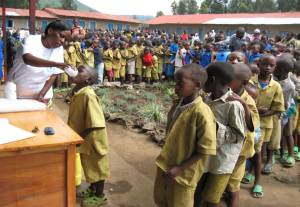By Professor Alan Fenwick OBE, Director of SCI (Schistosomiasis Control Initiative), Imperial College, London)

Schistosomiasis is a type of infection caused by parasites that live in fresh water, such as rivers or lakes, in subtropical and tropical regions worldwide. It is also known as bilharzia.
The Schistosomiasis Control Initiative (SCI) at Imperial College London supports Ministries of Health and Education in 16 countries to deliver medicines to treat people infected with schistosomiasis and three intestinal worms. The medicines are donated by various pharmaceutical companies, Merck KgGA (praziquantel), GSK (albendazle) and Johnson and Johnson (mebendazole), and for the most part, the targets are school aged children.

The SCI’s role includes advocacy at all levels in the countries from Ministers down through regional officials to teachers and health staff who deliver the medicines. These medicines are safe to swallow and effective. For the most part they are delivered annually through schools or through communities. We assist the countries with mapping so that the geographical distribution of the diseases is known, and then with preparing medicine donation requests.
We have just finished mapping Ethiopia where over 3,500 schools were visited and children were tested, and in Burundi and Rwanda where 350 schools in each country were visited and children tested. We assist with transportation of the medicines, training of teachers where necessary, and collection of baseline data and follow up data to allow us to report back to donors on the success of the campaigns in each country.
During 2013, we passed the milestone of having delivered over 100 million treatments against schistosomiasis since 2003, and with funding from DFID we are committed to supporting the delivery of another 200 million treatments by 2018.

So with DFID funding available, why do we need to expand coverage and what does that mean in terms of funding? Well, the Merck KgGA donation of praziquantel against schistosomiasis has been increased – from 20 million tablets per year in 2008 to 120 million tablets in 2015 and 250 million tablets annually from 2016. 250 million tablets of praziquantel are enough to treat 100 million children. To date, in our best year, we have treated 30 million and so expansion is essential. For the first time, the availability of donated medicines will exceed the funding available to deliver them. We reckon it costs us 50 pence per child to effectively run a programme in sub Saharan Africa and so a staggering £50 million is going to be needed per year from 2016 to 2020. There are some funds already available from DFID and USAID, but for SCI to ensure that these medicines are not wasted, we believe that we will need to raise an additional £2 million this year and £10 million subsequently.

But if we can deliver these medicines, imagine the effect on the health of the children in Africa. They are currently ravaged by parasitic infections which cause stunting, malnutrition, and liver and bladder diseases. For just an extra £10 million per year, we will improve the health of 100 million school aged children, improve their quality of life, education and prospects of growing into healthy adults.